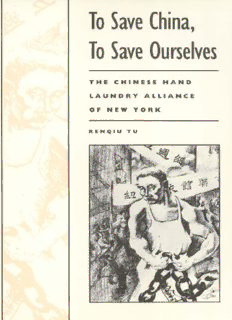
To Save China, to Save Ourselves: The Chinese Hand Laundry Alliance of New York PDF
Preview To Save China, to Save Ourselves: The Chinese Hand Laundry Alliance of New York
To Save China, To Save Ourselves: The Chinese Hand Laundry Alliance of New York Copyrighted Material In the series Asian American History and Culture, edited by Sucheng Chan Copyrighted Material Renqiu Yu To Save China, To Save Ourselves The Chinese Hand Laundry Alliance of New York Temple University Press Philadelphia Copyrighted Material Temple University Press, Philadelphia 19122 Copyright © 1992 by Temple University. All rights reserved Published 1992 Printed in the United States of America The paper used in this publication meets the minimum requirements of American National Standard for Information Sciences Permanence of Paper for Printed Library Materials, ANSI Z39.48- 1984 Library of Congress Cataloging-in-Publication Data Yu, Renqiu, 1955- To save China, to save ourselves: the Chinese Hand Laundry Alliance of New York / Renqiu Yu. p. cm. - (Asian American history and culture) Includes bibliographical references and index. ISBN 0-87722-996-1 (alk. paper) I. Chinese Hand Laundry Alliance of New York- History. 2. Laundry industry-New York (N.Y.)-History. 3. Chinese Americans in husiness-New York (N.Y.)-History. I. Title. II. Series: Asian American history and culture series. HD9999.L383U639 1992 338.4'76481 '097471- dc20 92-9205 .. Laundry Song" by Wen I-to, p. v, from Twentieth Century Chinese Poetry by Kai-Yu Hsu. Copyright © 1963 by Kai-Yu Hsu. Used by permission of Doubleday, a division of Bantam Doubleday Dell Publishing Group, Inc. Copyrighted Material Laundry Song (1923) By Wen I-to (One piece, rwo pieces, three pieces,) Washing must be clean. (Four pieces, five pieces, six pieces,) Ironing must be smooth. I can wash handkerchiefs wet with sad tears; I can wash shirts soiled in sinful crimes. The grease of greed, the dirt of desire .. . And all the filthy things at your house, Give them to me to wash, give them to me. Brass stinks so; blood smells evil. Dirty things you have to wash. Once washed, they will again be soiled. How can you, men of patience, ignore them! Wash them (for the Americans), wash them' You say the laundry business is too base. Only Chinamen are willing to stoop so low) It was your preacher who once told me: Christ's father used to be a carpenter. Do you believe it? Don't you believe it) There isn't much you can do with soap and water. Washing clothes truly can't compare with building warships. I, too, say what great prospect lies in this- Washing the others' sweat with your own blood and sweat? (But) do you want to do it? Do you want it) Year in year out a drop of homesick tears; Midnight, in the depth of night, a laundry lamp .. . Menial or not, you need not bother, Just see what is not clean, what is not smooth, And ask the Chinaman, ask the Chinaman. I can wash handkerchiefs wet with sad tears, I can wash shirts soiled in sinful crimes. The grease of greed, the dirt of desire ... And all the filthy things at your house, Give them to me-I'll wash them, give them to me! Copyrighted Material Copyrighted Material Contents Acknowledgments IX Chinese Names and Transliteration XI Introduction 1 One Chinese Laundrymen in New York City 8 Two The Emergence of the CHLA 31 Three The Alliance Is for the Laundrymen 50 Four "To Save China, To Save Ourselves" 77 Five "The People's Diplomacy" 100 Six The Struggle Over a Penny 138 Seven Where Is the Gold Mountain? 165 Conclusion 198 Notes 205 Bibliography 237 Index 247 Copyrighted Material Copyrighted Material Acknowledgments I am especially grateful to the two dozen elderly Chinese laun drymen I interviewed, some of them several times each, for sharing their experiences with me and for giving me access to their documents, news paper clippings, and pictures. I want to express my deep gratitude to Pro fessor Marilyn B. Young, Professor David Reimers, and Mrs. Naomi B. Levine for their constant encouragement and unfailing support from the very inception of the research for my dissertation until the completion of this book. I am also indebted to Professors Thomas Bender, Patricia Bonomi, Vincent Carroso, Warren Dean, A. Tom Grunfeld, Molly Nolan, Carl Prince, and other members of the History Department at New York University, for their support, advice, and encouragement. Special thanks are owed my friend John Kuo Wei Tchen, who intro duced me to New York City and to the history of New York's Chinese community. Actually, it was Jack who suggested this subject to me, and his support and help were indispensable during the study. I wish to express my profound appreciation to Professor Sucheng Chan and Kim Vivier, whose superb editing made the publication of this book possible. I am greatly indebted to Him Mark Lai, of the Chinese Historical Soci ety of America; Wei Chi Poon, of the Asian American Studies Library, University of California, Berkeley; and An Chen, of the C. V. Starr East Asian Library, Columbia University, not only for helping me find many valuable documents but also for providing this help in a timely manner. I would like to thank Fay Chew, Charles Lai, Mei-li Lin, Mary Ting Yi Lui, Judith Wingsiu Luk, and Dorothy Rony-the staff members of the New York Chinatown History Museum (formerly the New York China town History Project)-who were helpful whenever I showed up to ex plore their archives. I also thank Phyllis Deutsch, Harriet Jackson, Lynn Johnson, Annelise Orleck, Claire Potter, Nancy Robertson, and Suzanne Wasserman-my cheerful friends of the dissertation writing group at NYU-for reading the manuscript and for their insightful and construc- Copyrighted Material
Description: